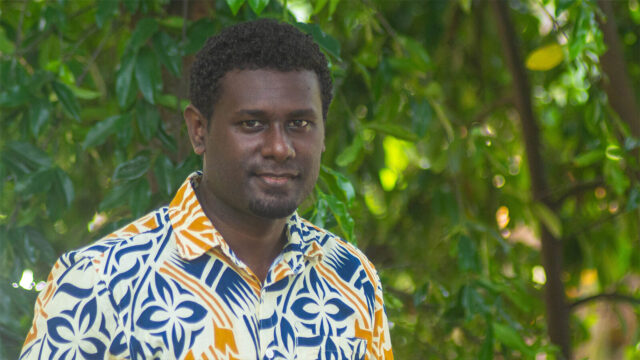God provided in Jesus the solution that both the remnant and the nations needed.

In 1926 Nikolai Vavilov had perhaps the “the least heralded scientific epiphany of the modern era.”1
He understood that it was necessary to preserve the seeds from the wild relatives and unknown varieties of the crops we eat in order to preserve the genes from which we could produce in the future the essential characteristics that crops need to fight diseases, develop pest resistance, and the ability to withstand extreme climate conditions.
What Vavilov conceived was the creation of the equivalent of Noah’s ark to protect a remnant of the seeds of the world, a seed bank that, in case of a catastrophe, would protect the seeds that could secure the survival of future food crops. Vavilov and his team considered this bank so important that they protected it with their lives. Nine of his colleagues died of starvation during the siege of Stalingrad during World War II protecting 400,000 seeds, roots, and fruits stored in their bank. One of them left a letter along with the enormous untouched collection: “When all the world is in the flames of war, we will keep this collection for the future of the people.”2 Today, there are about 1,400 seed banks around the world.
The Promise of a Remnant
Deceived by Satan, the serpent (Rev. 12:9), Adam and Eve’s fall in the Garden of Eden was a catastrophe of unimaginable magnitude that threatened the future of humanity. Satan had usurped the rule of this world (John 12:31; 14:30; 16:11) and humanity would have to be destroyed, with Satan, should he achieve complete dominion (Rom. 6:23; 5:12-14).
In order to secure the survival of humanity, God decided to preserve a “seed” that would challenge the dominion of the serpent and eventually defeat him, even if this should cost Him His own life. Thus God announced that He would put “enmity” between the serpent and the “seed”3 of the woman, and that the “seed” would eventually bruise the head of the serpent (Gen. 3:15).
God would preserve both a remnant of humanity that would pledge loyalty to Him and challenge Satan’s dominion, and also provide a Descendant, One who would destroy the power of Satan.4 The story of the redemption of humanity tracks this enmity. It follows God’s actions to preserve a remnant as an enclave of His kingdom and a carrier of the knowledge of Him in the face of Satan’s persistent attempts to destroy it and attain complete control over humanity.5
The Purpose of the Remnant
Scripture identifies Noah and his family as the first remnant (Gen. 7:23). When humanity became depraved to the extent that every intention of the thoughts of their heart “was only evil continually” (Gen. 6:5, 11), God preserved a future for humanity and the animals through Noah, a righteous man (Gen. 6:8; 7:1). He entrusted Noah with a message of warning to the world about the incoming destruction, and asked him to build an ark to preserve those who heard his call (Heb. 11:7; 1 Peter 3:20; 2 Peter 2:5). God’s purpose was not only to preserve a remnant of humanity but also to preserve the knowledge of Him for future generations.
Not all of Noah’s children, however, remained faithful to God (Gen. 9:25). Yet the knowledge of God was preserved through the line of Shem, which recognized God as their sovereign and God dwelt among them (Gen. 9:27). A remnant, then, is not simply the persons God is able to preserve from a catastrophe, but a visible instrument He uses to preserve the knowledge of Him and to call the world back to Him.
God continued to preserve a remnant in later crises.6 Following the rebellion of the nations of the earth at the Tower of Babel God chose Abraham—who was from the line of Shem and had remained faithful to God’s original call (Gen. 11:31)—to bless him and to bless through his descendants all the nations of the earth (Gen. 12:1-3; 22:16-18). God intended that Abraham’s seed, the people of Israel, would become God’s treasured possession to whom God would entrust His law and upon whom He would bestow His blessings (Ex. 19:5; Deut. 4:5-8; 28:1-4). They would be a “kingdom of priests,” whose work was to disseminate the knowledge of God to the nations (Ex. 19:6; Mal. 2:7). Thus, God protected Israel both as a remnant from the nations and the instrument through whom He wanted to call the nations back to Him (Gen. 45:7; Amos 5:15). But sadly, Israel failed to glorify God and profaned His name among the nations (Eze. 36:20-23; 39:7).
Flawed Remnants and Future Cleansing
Throughout history God has worked through those who have remained loyal to Him in the midst of widespread apostasy. But these remnants have always consisted of flawed individuals and groups of people that needed God’s saving grace just as much as those people God wanted to save through them.
Noah and his children, Abraham and his descendants, Judah and those taken to Babylon, all committed grave mistakes. The paradox of the flawed instrument is probably best expressed in God’s description of His people as His vine or vineyard. God brought a “choice vine” “from Egypt” and planted it “on a very fertile hill” so that it would send out its branches to the nations but Israel became a “wild vine” that produced “wild grapes.”7
The problem of Israel was deep-seated. The reason for its recurrent failure was that they had become a “wild vine.” More than changing their actions, the remnant needed a change of nature. This has been true for all remnants throughout history. The prophets predicted, however, that God would cleanse the remnant of His people as silver is refined (Zech. 13:8, 9). Pride, deceit, jealousy, stumbling, and evildoers would be removed from them and God would put His law and His Spirit in their hearts.8 This cleansed remnant would include people from many nations (Zech. 8:20-23; 14:16) and would attract the world back to God (Isa. 2:2-4; 60:1-3).
Jesus and the 144,000
God had revealed, however, the solution to the conundrum of the frail remnant from the very beginning. The “seed” of the woman was both a group of people and one person. God predicted that there would be “enmity” between the serpent and the “seed” of the woman throughout history, but that it would be “One,” a “He,” who would smash the serpent’s head (Gen. 3:15).9 Paul also explained that the “seed” of Abraham was One, Christ (Gal. 3:16).10 Jesus Himself affirmed this when He said, “I am the true vine, and my Father is the vinedresser” (John 15:1). Jesus was perfectly faithful,11 revealed the Father explaining the true meaning and depth of the law of God,12 and attracted all humanity back to God.13 Thus God provided in Jesus the solution that both the remnant and the nations needed.
Those who pledge loyalty to God join Christ. They are “branches” ripped from the wild vines that are grafted into the “true vine.” As they open their being to the trunk and drink from its sap, they partake of the life of the trunk and of its nature (2 Peter 1:4). This is the miracle of a new birth for the branches, who are to grow toward all the nations so that its fruit may bring glory to the divine “vinedresser” (Matt. 28:18-20; John 15:8).
The work of Christ will reach a climactic fulfillment in the last generation of believers on this earth. The predictions in Scripture of a future cleansed remnant will be fulfilled in them.14 They are the ones from among the churches who will “overcome” (Rev. 2; 3). Revelation refers to them as the 144,000 who have been sealed, who remain faithful, from among God’s nominal people.15 They have been purified in the blood of the Lamb (Rev. 7:4–-14). In the darkest moment of history, in the face of dragon and beast threats (Rev. 13), they will remain pure, because they “follow the Lamb wherever He goes” (Rev. 14:1-5). They keep witnessing to the truth by keeping “the commandments of God,” holding “to the testimony of Jesus,” and calling “those who dwell on earth” back to God (Rev. 14:6-12, 12:17). They will succeed because the trunk into which they have been firmly grafted will never fail.
1 Charles Siebert, “Food Ark,” National Geographic 220, no. 1 (July 2011): 108-131.
2 In Al Gore, “The Edge,” The Future: Six Drivers of Global Change (Kindle ed. (New York: Random House, 2013), chap. 6.3 The Hebrew world translated “offspring” also means “seed” (zera‘).
4 See the analysis by Jacques Doukhan, “The Seed,” On the Way to Emmaus: Five Major Messianic Prophecies Explained (Clarksville, Md: Lederer, 2012), chap. 1.
5 On the idea of a remnant that preserves humanity in the face of extinction, see Angel M. Rodríguez, ed., Toward a Theology of the Remnant: An Adventist Theological Perspective (Silver Spring, Md: Biblical Research Institute, 2009), p. 24.
6 Elijah and 7,000 faithful persons (1 Kings 19:14, 18); Judah (2 Kings 17:18); people taken to Babylon (2 Kings 25:11); those who would return from exile (Jer. 31:7-9, 31-34); see Rodríguez, pp. 25-33.
7 This is a composite picture taken from Psalm 80:8-18; Isaiah 50:1-7; Jereremiah 2:21; 5:10; 6:9; Ezekiel 15:1-5; 17:1-21; 19:10-14; Hosea 10:1, 2; Joel 1:7.
8 Isaiah 11:10-13; Jeremiah 31:7-9, 31-34; Ezekiel 36:22-32; Zephaniah 3:11-13; Malachi 3:16–4:3; Matthew 13:24-30, 37-43; 25:1-4, 31-33.
9 See Doukhan.
10 See also Rodríguez, pp. 201-203.
11 Hebrews 4:15; 7:26-28.
12 John 1:14-18; Matthew 5:17-48.
13 John 12:32; 17:4, 6.
14 See note 8 above.
15 Rodríguez, pp. 91-94.
Felix H. Cortez, Ph.D., is an associate professor of New Testament literature at the Seventh-day Adventist Theological Seminary at Andrews University in Berrien Springs, Michigan, United States.









